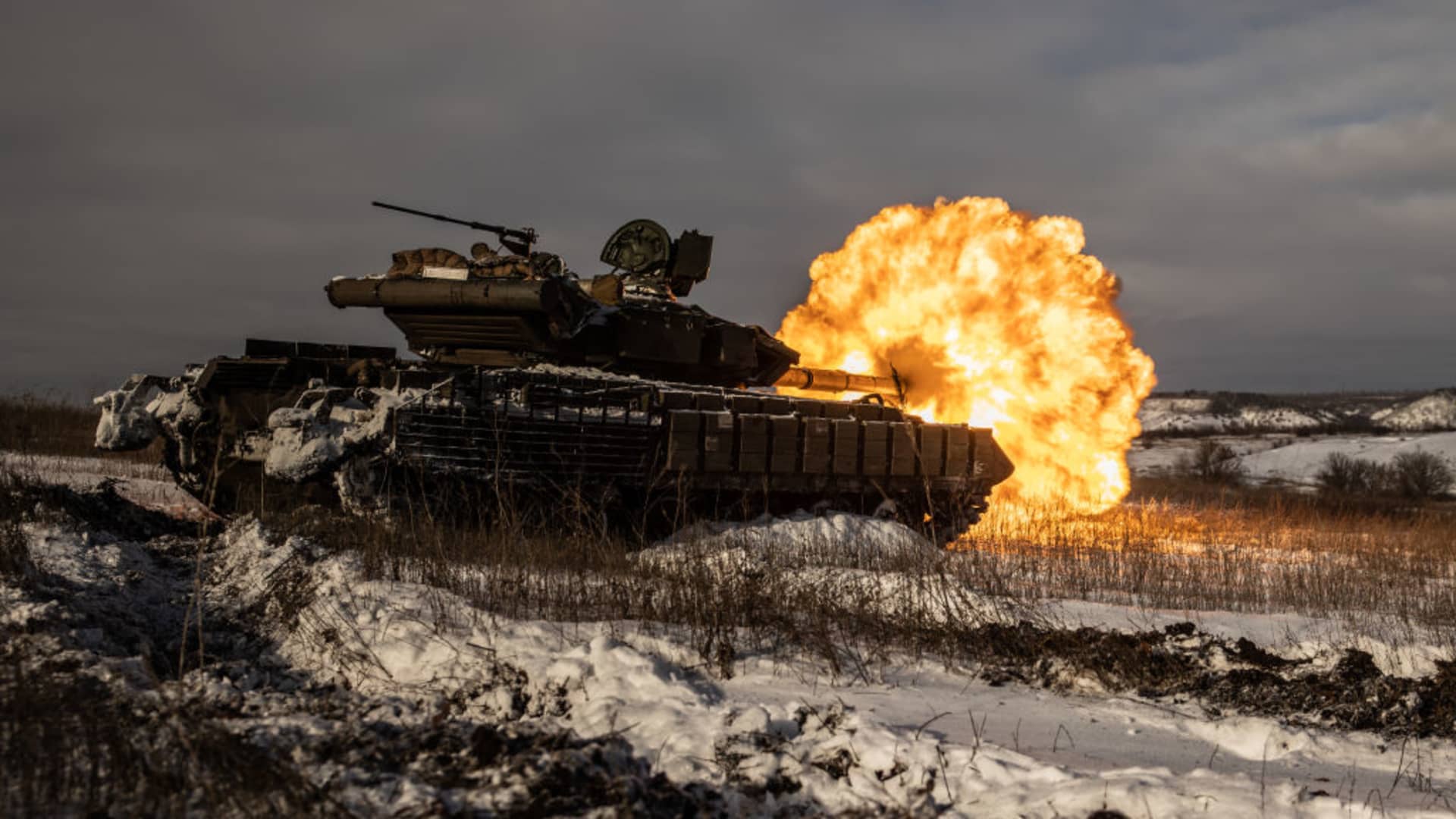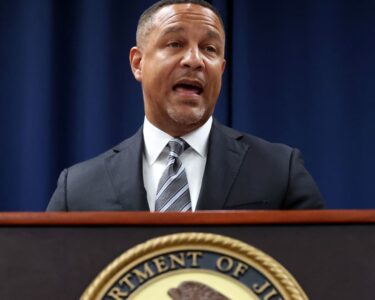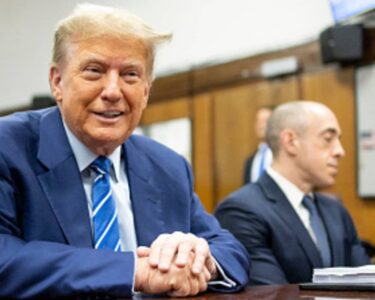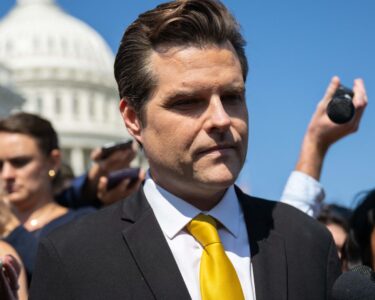This was CNBC’s live blog tracking developments on the war in Ukraine. See below for updates.
French President Emmanuel Macron said Monday that the sending of Western troops to Ukraine has not been “ruled out,” a suggestion the Kremlin balked at Tuesday.
Speaking after a meeting of European heads of state and other Western officials in Paris — which touched on aid to Ukraine amid its pressing war needs — Macron said the possibility of sending ground troops to Ukraine was discussed.
“There is no consensus today to officially, openly, and with endorsement, send troops on the ground. But in terms of dynamics, nothing should be ruled out. We will do everything necessary to ensure that Russia cannot win this war,” Macron said.
The president did not give any further details on which countries could consider sending troops but said France was “not against sending them.”
The Kremlin balked at the suggestion Tuesday, with Press Secretary Dmitry Peskov telling reporters that if NATO member troops did fight in Ukraine than talk would have to change to the inevitability of a NATO-Russia conflict.
In other news, Hungary voted to approve Sweden’s NATO accession bid on Monday, ending months of diplomatic negotiations and obstacles over the membership bid. It first applied to join the military alliance in May 2022 but had faced opposition from NATO members Hungary and Turkey.
French Foreign Minister Stephane Sejourne on Tuesday said French troops could take on non-combat roles rather than active battle in Ukraine.
The comments come after French President Emmanuel Macron indicated that Western leaders had discussed sending ground troops to Ukraine, which was quickly played down by allies.
“We must consider new actions to support Ukraine. These must respond to very specific needs, I am thinking in particular of mine clearance, cyberdefence, the production of weapons on site, on Ukrainian territory,” he told lawmakers, Reuters reported.
“Some of its actions could require a presence on Ukrainian territory, without crossing the threshold of fighting. Nothing should be ruled out. This was and still is the position today of the president of the Republic,” he said.
— Sophie Kiderlin
Ukrainian President Volodymyr Zelenskyy on Tuesday met with Saudi Crown Prince Mohammed bin Salman, he said in a post on social media platform X.
Zelenskyy said they discussed the so-called “peace formula,” a ten-point plan set out by Ukraine to end the war with Russia, and Saudi Arabia’s support in this.
“Last year in Jeddah, we held an effective advisors’ meeting to discuss its implementation. We are now nearing the first Peace Summit and rely on Saudi Arabia’s ongoing active support,” he said.
Prisoners of war were also discussed, Zelenskyy said, pointing to Saudi Arabia’s previous involvement in prisoner exchanges.
— Sophie Kiderlin
Russia’s defense ministry said its forces had captured another settlement near Avdiivka, the industrial city it seized several weeks ago in Ukraine’s eastern Donetsk region.
Posting on Telegram, Russia’s defense ministry said troops within its central units had “liberated the village of Severnoye, occupied more advantageous lines and positions, and also defeated concentrations of manpower and equipment” of several Ukrainian brigades in Donetsk.
Ukraine conceded that its units had withdrawn “from the small settlements of Severne and Stepove,” emphasizing their small size by noting that before the war, the villages had less than a hundred inhabitants each.
The latest territorial gain comes after Ukrainian forces withdrew from the Donetsk industrial city of Avdiivka in mid-February, marking a significant loss for Ukraine. Its military said it had withdrawn their outgunned units in order to prevent them from being surrounded.
After Avdiicka, Russian forces have been looking to build on gains in a westward direction and have captured several settlements in the last week; on Monday, Ukraine confirmed its forces had withdrawn from the village of Lastochkyne.
Russia’s defense ministry said Tuesday that Ukraine’s forces had tried to mount counterattacks “in the areas of the settlements of Novgorodskoye, Pervomaiskoye and Petrovskoye of the Donetsk People’s Republic,” the name pro-Russian separatists gave to Donetsk, but that these had been repelled.
Russia claimed Ukraine had lost up to 485 military personnel, two tanks, including U.S.-made Abrams, three infantry fighting vehicles, including a Bradley, six armored combat vehicles, 13 vehicles, and two D-30 howitzers, in the process. CNBC was unable to verify the battlefield claims.
— Holly Ellyatt
Russia’s Defense Minister Sergei Shoigu claimed Tuesday that Ukraine had lost 444,000 servicemen since the start of the war, or Russia’s “special military operation, as it describes its invasion of Ukraine.
“As a result of the decisive and active actions of our military personnel, the combat potential of the Ukrainian armed forces is decreasing. On average, since the beginning of the year, the enemy has been losing more than 800 personnel and 120 units of various weapons, including foreign-made ones, every day,” Shoigu claimed Tuesday in a speech made to the defense ministry, according to a NBC translation of his comments.
In total, during the operation, the Ukrainian armed forces had lost over 444,000 military personnel, he said, without presenting evidence to back up his comment.
“After the collapse of the counteroffensive, the military command of the Ukrainian Armed Forces is trying to use the remaining reserves to stabilize the situation and prevent the collapse of the front,” Shoigu added.
Ukraine is certainly experiencing some setbacks on the battlefield, with the recent loss of Avdiivka and several other settlements to Russian forces in Donetsk, eastern Ukraine, in the last week. Russia’s claims that Ukraine has lost over 444,000 personnel is wildly above Ukraine’s admission last weekend that it had lost 31,000 troops in the war so far.
“31,000 Ukrainian soldiers have died in this war. Not 300,000 or 150,000, or whatever Putin and his lying circle are saying. But each of these losses is a great loss for us,” Ukrainian President Volodymyr Zelenskyy said at a news conference Sunday.
Russia has been tight-lipped about its own losses since the start of the war although 315,000 Russians are estimated to have been killed or wounded, U.S. defense officials believe.
Ukraine’s military said last weekend that over 411,000 Russian personnel had been killed in the war.
Both Russia and Ukraine tend to exaggerate the losses they’ve inflicted upon each other and accurate figures are not likely to be achieved given the imprecise collection of data during the war.
— Holly Ellyatt
Berlin has dismissed the notion of sending ground troops to Ukraine, a day after France’s president suggested that some of Ukraine’s allies had not “ruled out” this possibility.
German Chancellor Olaf Scholz on Tuesday rejected the idea, saying that there was no consensus over deploying ground troops among European leaders and officials from the U.K., Canada and U.S., who had met in Paris on Monday.
“Once again, in a very good debate, it was discussed that what was agreed from the outset among ourselves and with each other also applies to the future, namely that there will be no ground troops, no soldiers on Ukrainian soil sent there by European countries or NATO states,” Scholz said on the sidelines of an event, according to comments carried by Reuters.
Scholz reportedly added that European leaders now appeared more willing to procure weapons from third countries outside Europe, in order to accelerate military aid to Ukraine.
Germany is one of Ukraine’s biggest supporters in Europe, but it has been wary of escalating tensions with Russia, deliberating at length over whether to supply Ukraine with Leopard tanks and long-range Taurus missiles.
French President Emmanuel Macron raised eyebrows on Monday, when he suggested that “nothing should be ruled out” when it came to the prospect of “troops on the ground” in Ukraine. He further said that “we will do everything necessary to ensure that Russia cannot win this war,” but did not give any details on which countries might support the idea of sending ground troops into Ukraine.
Germany’s Vice-Chancellor Robert Habeck also commented with “advice” for France, saying that Paris would be more helpful by sending weaponry and tanks to Ukraine, Reuters reported. He likewise said that there would be “no German soldiers on Ukrainian soil.”
The Kremlin warned on Tuesday that conflict between Russia and NATO would become inevitable, if members of the military coalition send troops to fight in Ukraine.
— Holly Ellyatt
The Kremlin on Tuesday warned that if European members of NATO sent troops to fight in Ukraine then it would make a conflict between Russia and NATO inevitable.
French President Emmanuel Macron opened the door on Monday to European nations sending troops to Ukraine, although he cautioned that there was no consensus at this stage as allies agreed to ramp up efforts to deliver more munitions to Kyiv.
Asked about Macron’s remarks, Kremlin spokesman Dmitry Peskov told reporters that if it came to pass that NATO member troops did fight in Ukraine than talk would have to change to the inevitability of a NATO-Russia conflict.
— Reuters
Russia’s Defense Ministry reportedly said on Tuesday that its forces were preventing Ukrainian forces from crossing the Dnieper river to reach the Russian-occupied left bank.
Russian state news agency Tass reported a statement from the ministry that said it had destroyed Ukrainian forces’ armored vehicles, observation posts and positions on the right bank of the Dnieper, from which Ukrainian forces were launching attempts to cross the river over to the Russian-occupied bank and the village of Krynky, which Russia claimed to have recaptured from Ukraine last week.
“Russian military personnel, UAV [unmanned aerial vehicles] operators reveal the location of the equipment and weapons of the Ukrainian Armed Forces on the right bank of the Dnieper and destroy targets with precise strikes from UAVs and artillery, preventing the enemy from preparing and crossing to the islands and the left bank in the Krynok [Krynky] area,” the ministry said as reported by Tass.
Last fall, Ukrainian forces managed to cross the Dnieper river that divides the Kherson region with Ukrainian forces in the right, or western, side of the river and Russian forces occupying the left, or eastern, bank.
Russia conceded last November that some Ukrainian forces had crossed the river and set up positions in and around the village of Krynky but said they would be destroyed.
Last week, Russian Defense Minister Sergei Shoigu said Russian forces had reclaimed Krynky, stating in a televised meeting with Putin that the village had been “cleared.”
— Holly Ellyatt
Veteran human rights activist Oleg Orlov was sentenced on Tuesday by a Moscow court to two and a half years in prison after he was found guilty of discrediting Russian’s armed forces in a trial that has been condemned by international observers as politically motivated.
Orlov, 70, has served for more than two decades as one of the leaders of rights group Memorial. It won a share of the Nobel Peace Prize in 2022, a year after being banned and dissolved in Russia.
— Reuters
The last hurdle to Sweden’s accession to NATO was removed on Monday, with Hungary’s parliament approving the country’s membership bid after months of objections. Here’s a quick assessment of what Sweden brings to the defense alliance as its 32nd member.
“Sweden notably brings to NATO a well-equipped army, over a hundred advanced fighters, a modern navy including five submarines, as well as a technologically advanced defence industrial base,” Neil Melvin, director of International Security at defense think tank RUSI, said in a statement Tuesday.
“Sweden’s membership of the Alliance alongside Finland, which was triggered by Moscow’s decision to invade Ukraine, is part of a transformation of northern Europe into a NATO bastion,” he said.
“Russia’s actions have thus set in motion security shifts, including now Swedish NATO membership, that mean Moscow faces being militarily excluded from the Baltic Sea and its airspace, while NATO can project force more effectively across Scandinavia and into the High North and Arctic.”
Russia is now confronted with the need to build up significant military force in its north to balance the new NATO regional strength, Melvin said, adding that the necessity would further stretch Russia’s resources.
— Holly Ellyatt
North Korea has shipped about 6,700 containers carrying millions of munitions to Russia since July to support its war against Ukraine, in a sign of ongoing arms transfers, South Korean media reported on Tuesday, citing the defence minister.
At a briefing on Monday for local media, Minister Shin Won-sik said the containers might carry more than 3 million 152 mm artillery shells, or 500,000 122 mm rounds.
“It could possibly be a mix of the two, and you can say that at least several million shells have been sent,” Shin said, according to the Yonhap news agency.
Hundreds of North Korean munitions factories are running at around 30% of their capacity due to a lack of raw materials and electricity, but those producing artillery shells for Russia were operating “at full swing,” he added, without elaborating on the source of the information.
Seoul and Washington have accused Pyongyang and Moscow of trading arms and condemned the North for supplying weapons to Russia for use against Ukraine. Both countries have denied it even as they pledged to strengthen military cooperation.
The U.S. State Department, in a fact sheet released on Friday, said that North Korea has delivered more than 10,000 containers of munitions or related materials to Russia since September.
In exchange, North Korea has received some 9,000 containers mostly containing food supplies, which Shin said has helped stabilise prices there.
An official at Seoul’s defence ministry said it could not confirm the numbers, but quoted Shin as saying that Russia has sent nearly 30% more containers since July to North Korea than the has North shipped.
Shin said North Korea could fire another satellite as early as next month as Moscow continued to provide technical aid, and Pyongyang has also asked for assistance with aircraft and ground mobility equipment technology.
“It is unclear how much Russia will give, but the more dependent Russia gets on North Korean artillery shells, the greater the degree of Russian technology transfers will be,” he said, according to Yonhap.
— Reuters
Russia’s “weaponisation of energy will likely remain a coercive instrument” against Ukraine and the wider world, Britain’s Ministry of Defense said.
“It is highly likely that Russia will continue to use energy as a weapon for global economic gain and political influence, signifying the link between energy, security, political and military objectives,” the ministry said in an intelligence update on X, formerly known as Twitter, on Monday.
Throughout the two-year conflict with Ukraine, Russia has focused many of its attacks on Ukraine’s energy infrastructure, often leaving thousands of Ukrainian civilians without power and water during the coldest times of the year.
One of the world’s largest oil and gas producers, Russia continues to rely on oil and gas export revenues to fund its budget and war machine. India and China are among the countries still buying Russian oil and gas while Western countries look to reduce their imports of Russian commodities. There has been some dissent among Ukraine’s allies over Russian imports, however, with more Russia-friendly countries like Hungary and Turkey looking to strike energy deals with Moscow.
Russia’s kinetic strikes on Ukrainian energy infrastructure have caused widespread electricity shortages across the nation, the U.K. noted, “while globally Russian President Vladimir Putin has used energy policy to undermine international energy security.”
“By reducing gas flows to Europe, through restricting pipeline exports and altering payment terms, Putin has sought to undermine unity across Europe against Russia’s illegal war,” the ministry said.
— Holly Ellyatt
French President Emmanuel Macron said Monday that the sending of Western troops to Ukraine has not been “ruled out.”
Speaking after a meeting of European heads of state and other Western officials in Paris, at which more aid to Ukraine was discussed, Macron said the possibility of sending ground troops to Ukraine had been openly discussed but that no decisions were made.
“There is no consensus today to officially, openly, and with endorsement, send troops on the ground. But in terms of dynamics, nothing should be ruled out. We will do everything necessary to ensure that Russia cannot win this war,” Macron said.
The president did not give any further details on which countries could consider sending troops but said France was “not against sending them.”
Macron said Ukraine’s allies had discussed the need to increase and accelerate military aid and supplies to Kyiv, as well as a need to close sanctions loopholes allowing Russian companies to source components from countries that had imposed European or allied sanctions.
He said the EU would “impose further sanctions on companies and countries that facilitate this circumvention of sanctions.”
— Holly Ellyatt
Ukraine’s President Volodymyr Zelenskyy said on Monday that without new U.S. military aid his country would be unable to defend a Black Sea shipping corridor that has allowed Kyiv to export millions of tons of grain to global markets, Reuters reported Monday.
Ukraine launched the shipping corridor hugging its western Black Sea coast near Romania and Bulgaria in August, a month after Russia quit a year-long landmark deal – brokered by the United Nations and Turkey – that had allowed the safe Black Sea export of nearly 33 million metric tons of Ukraine grain.
Ukraine is on track to export all grain from its 2023 harvest despite Russian attacks on Ukrainian ports and infrastructure, Britain’s foreign office said this month.
“We … created the new route in the Black Sea,” Zelenskyy told CNN in an interview, describing the shipping corridor as a “big success” for so far allowing the export of about 30 million tones of grain and other agricultural products.
— Reuters
Hungary on Monday voted to approve Sweden’s NATO accession bid, ending months of diplomatic negotiations and finalizing Stockholm’s membership almost two years after it first applied to join the military alliance.
Members of the governing party led by Hungarian Prime Minister Viktor Orban had been opposed to Sweden joining NATO amid the country’s criticism of Hungary’s democracy.
Sweden applied to join NATO in May 2022 following Russia’s full-scale invasion of Ukraine, shifting away from its previous policy approach of military non-alignment.
Read the full story here.
— Karen Gilchrist, Sophie Kiderlin
Ukrainian President Volodymyr Zelenskyy and Bulgarian Prime Minister Nikolai Denkov discussed economic relations and support in a meeting on Monday, Zelenskyy said in a post on social media platform X.
“I appreciate Bulgaria’s support for our efforts to expand trade flows and restore normal shipping in the Black Sea and Danube regions,” Zelenskyy said. “We agreed with Bulgaria to accelerate the development of logistics and infrastructure in our region.”
Infrastructure on the Danube river in the south of Ukraine has been crucial to the country’s grain trade since a previous deal that allowed safe passage for grain and other traded goods through the Black Sea was halted by Russia last year.
— Sophie Kiderlin
Russian opposition politician Alexei Navalny was close to being freed in a prisoner swap at the time of his death, Maria Pevchikh, a Navalny ally, said on Monday.
Speaking on YouTube, Pevchikh — who alleges the Russian authorities murdered Navalny, something they deny — said Navalny and two U.S. nationals were in line to be exchanged for Vadim Krasikov, a Russian FSB security service hit man who is serving a life sentence in Germany.
— Reuters
Russian President Vladimir Putin will meet with his Turkish counterpart, President Recep Tayyip Erdogan, after the Russian presidential election in mid-March, the Kremlin said Monday.
“Before the elections, no,” Kremlin Press Secretary Dmitry Peskov told reporters on Monday, when asked when the meeting might take place.
“But preparations for contacts at the highest level are underway, we have repeatedly stated this,” he said, news agency Interfax reported.
Peskov explained that “these contacts will take place at a time when it best suits the schedules of the two presidents.”
Putin will travel to Turkey for the meeting with Erdogan, a leader who has managed to maintain cordial relations with Russia despite Turkey’s NATO membership.
— Holly Ellyatt
Ukraine’s military confirmed Monday the retreat from the village of Lastochkyne in eastern Ukraine, marking another setback on the battlefield two years into the war.
“Ukrainian Armed Forces units withdrew from the village of Lastochkyne in order to organise defences… and prevent the enemy from advancing further in a western direction,” military spokesperson Dmytro Lykhoviy said on television, Reuters reported.
Russian forces have made several major and minor advances in recent weeks, including the capture of the industrial city of Avdiivka, as well as a couple of smaller settlements to the west of the city.
— Holly Ellyatt
Russia is preparing a new summer offensive against Ukraine, Zelenskyy says; China slams sanctions threat






